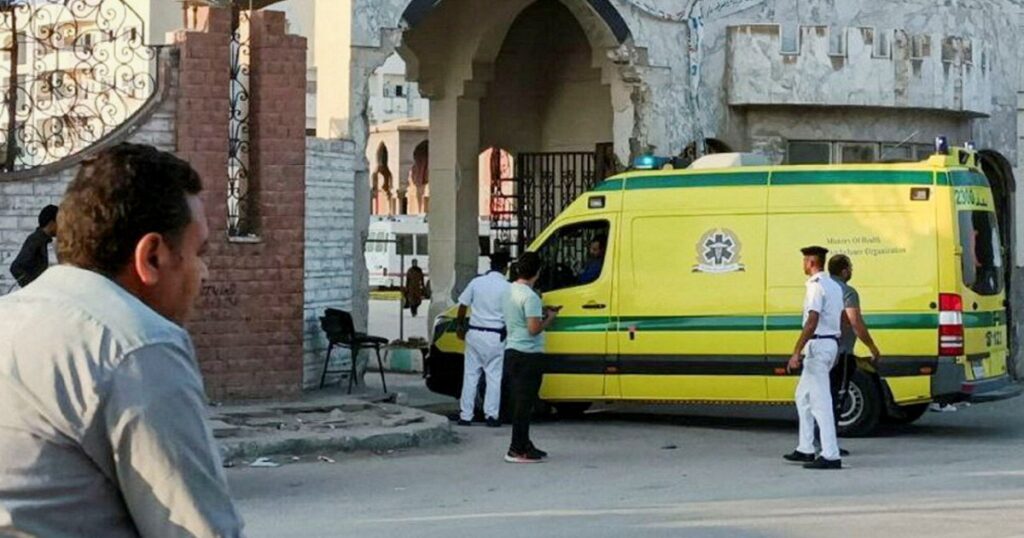Gaza strip – Ismail Al-Fajm is relieved that his nephew, seven-year-old Salem Sammour, is among 81 injured Palestinians who could cross the besieged Gaza Strip into Egypt from the Rafah crossing on Wednesday.
Sammour had lost his father and other family members in an air raid just over two weeks ago. The young boy’s body is riddled with shrapnel that severed part of his flesh, leaving him writhing and screaming in pain. Meanwhile, his mother needs treatment for her own injuries.
“Medical capacity in Gaza is limited and the doctors were unable to deal with the child’s condition,” explains the uncle as he tries to calm Sammour, while preparing him to leave the Nasser hospital in Khan Younis, southern Gaza. “His treatment in Egypt represents hope and an opportunity for him to live. »
On Wednesday, Nasser Hospital staff – and their families – were busy helping 19 patients as they boarded ambulances that took them to the Rafah crossing.
After weeks of negotiations, Qatar finally managed to negotiate the limited evacuation of the first group of wounded from Gaza to Egypt, where rows of ambulances were waiting to take them to hospitals on the Sinai Peninsula.
“I hope this is just the beginning. I pray that all those injured receive the help they need. Let this not be a one-off thing,” says Al-Fajm.
Since the Hamas attack on southern Israel on October 7, which left 1,400 people dead, Israel has bombarded Gaza, killing more than 8,700 people, including more than 3,000 children. Israel has threatened or attacked several hospitals and medical facilities, where it accuses Hamas of hiding bases and missile installations. More than a dozen hospitals in Gaza are out of service, while others are struggling to operate due to a shortage of fuel due to Israel’s total blockade of the enclave.
‘I will walk again’
Pushed on a wheelchair not far from Sammour, Aseel Al-Astal, 10, smiles, then grimaces in pain, only to smile again. She lost more than 15 family members in Israeli bombings and suffered multiple fractures herself. His face is covered in cuts. As she is helped into an ambulance that will take her to Rafah, she raises her fingers to signal her victory and speaks with joy of the possibility of being cured.
“I am very happy because I can be treated and be able to walk again,” she says. Pointing to the splint that covers most of her right foot, she says: “I can go back to Gaza without this and play with all my friends like I did before the war.” »
She teases the paramedics and a few relatives who came to say goodbye to her and cheer her up. She pretends to jump out of the wheelchair by herself and get into the ambulance.
According to her cousin, who will accompany Al-Astal on her trip and asked to remain anonymous, the girl underwent some medical procedures at the hospital, but doctors were not able to fully take into account his health, which prompted them to include him. in the list of injured people who need treatment outside Gaza.
Praying for her loved one’s recovery, Al-Astal’s cousin wishes that the other injured also have a chance at a full recovery. “I know a lot of them, and they are happy for those selected from this first class. But they all hope to be among the next to leave,” she says.
“Save them before they die too”
Nasser Hospital director Dr. Nahed Abu Taaema says many of the remaining injured are in desperate need of treatment. “There have been several cases of deaths among those seriously injured as they waited for this opportunity to travel abroad for treatment. If the opportunity for the next group to leave continues, many more will not make it,” he told Al Jazeera.
Abu Taaema explains that a committee made up of doctors, consultants and department heads drew up the list of people to be treated as priorities in Egypt, with priority given to children and women, especially those suffering from head injuries. head and spine. , chest and others.
“But due to the severe shortage of supplies and the severity of many other cases, there are many other cases that are not on this list and also require immediate and specific attention,” he says. “They too must be rescued before they too die or deteriorate. »
This functionality was produced in collaboration with Egab.

